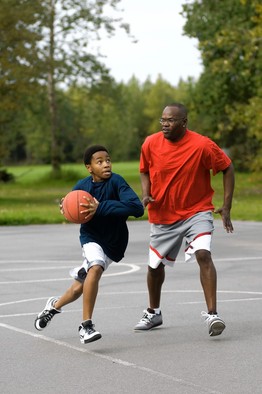
WALL STREET JOURNAL, Saturday, April 05, 2014 By GORDON MARINO
Never mind the wagging fingers of psychologists and self-appointed parenting gurus. When it comes to sports, there is nothing intrinsically wrong with living through your children.
As a young man, I wanted nothing more than to make it to the Elysian fields of the National Football League. Though I had a modicum of success in both baseball and football, my would-be career ended with an injury in college.
Years later, my wife and I had two boys, and little by little I started bringing balls and plastic bats into the living room. Before they were 10, we were practicing every day. Though my boys never made it to the pros, good things came from the hours we spent on practice fields. Football opened the gates to college for one of my sons, and for the other, his early success in baseball put sturdy legs under his self-confidence. And just consider some other products of obsessive sports parenting: Mickey Mantle, Jim Kelly, Tiger Woods, Serena and Venus Williams.
For me, all those years of practice with my boys formed, more than anything else, a special sense of intimacy among us. I don’t regret it—but here’s what I wish I had known at the start.
Watch your emotions: Pressure comes in many different forms.
As a sophomore transfer to a high-school program that was nationally known for its football success, my quarterback son tossed six touchdowns in his first scrimmage. Truth be told, it was one of the most joyous days in my life. When my son trotted off the field, he could see tears streaming down my cheeks. He did a double take and no doubt got the sense of, “Yikes. This means an awful lot to Dad!” That can be a heavy burden for a teenager to bear.
Be realistic. Young people often develop at vastly different rates. The kid who is slow today may be fast later and vice versa. That can make it difficult to assess just how much is in the bank of natural talent.
One of my boys could have been in the Hall of Fame for Little League hurlers. Kids in town would routinely slap him on the back and say, “See you in the majors.” Every day, he delighted in pitching to me in the backyard. We worked like scientists on technique, and he was running sprints for conditioning before he was 12. Games were almost a joke because he would usually strike out every batter.
But at 13, when other boys were hitting their growth spurts, my guy tipped the scales at less than 100 pounds. And at that point he moved up from Little League, so he was now tossing the ball not from 45 feet but from a daunting 60—a tall order for a boy who measured 4’10”.
Instead of recalibrating my own expectations, I pushed harder. In the process, I transformed baseball for him from a field of fun and dreams into a grinding exercise haunted by the prospect of failure. Two years later, he was done with the sport that had once been such a source of pleasure to him.
Be honest with yourself (and your spouse) about what your kid’s athletic prowess means to you.
Many fanatical sports parents tell themselves, “It’s just fun. No pressure.” During my college football career, two fathers died from heart attacks in the stands. That should tell us something. If you are going to be a responsible sports tiger parent, you need to acknowledge and come to terms with your feelings.
When he was in high school, my signal-calling son received national recognition one week for his passing. I effused to my wife that I would prefer these kudos for my son to winning the Nobel Prize myself. And I meant it. Her eyes wide, my indulgent wife looked at me as if I had really lost it. Though my sons didn’t know it, I went into therapy to help control the wave of emotions that washed over me during those Friday night football games.
Remind yourself that you are not your child.
When my son’s college football career ended, I worried that he would feel empty with the game gone. When I told him this, he said, “Dad, I never needed football the way you did.” He had his own relationship with the game, and it was different from mine.
Find some other hobbies.
Years ago, when I was an assistant college football coach, one of our players came to my office. After some shuffling of feet, he informed me that he was quitting. We talked for a while. Then he sat there looking forlorn. “What’s the matter?” I asked. Staring straight ahead, he confided, “Football is all my dad and I ever talked about. I’m worried we won’t have anything to say to each other anymore.”
—Dr. Marino, a professor of philosophy at St. Olaf College, trains boxers in Minnesota.






